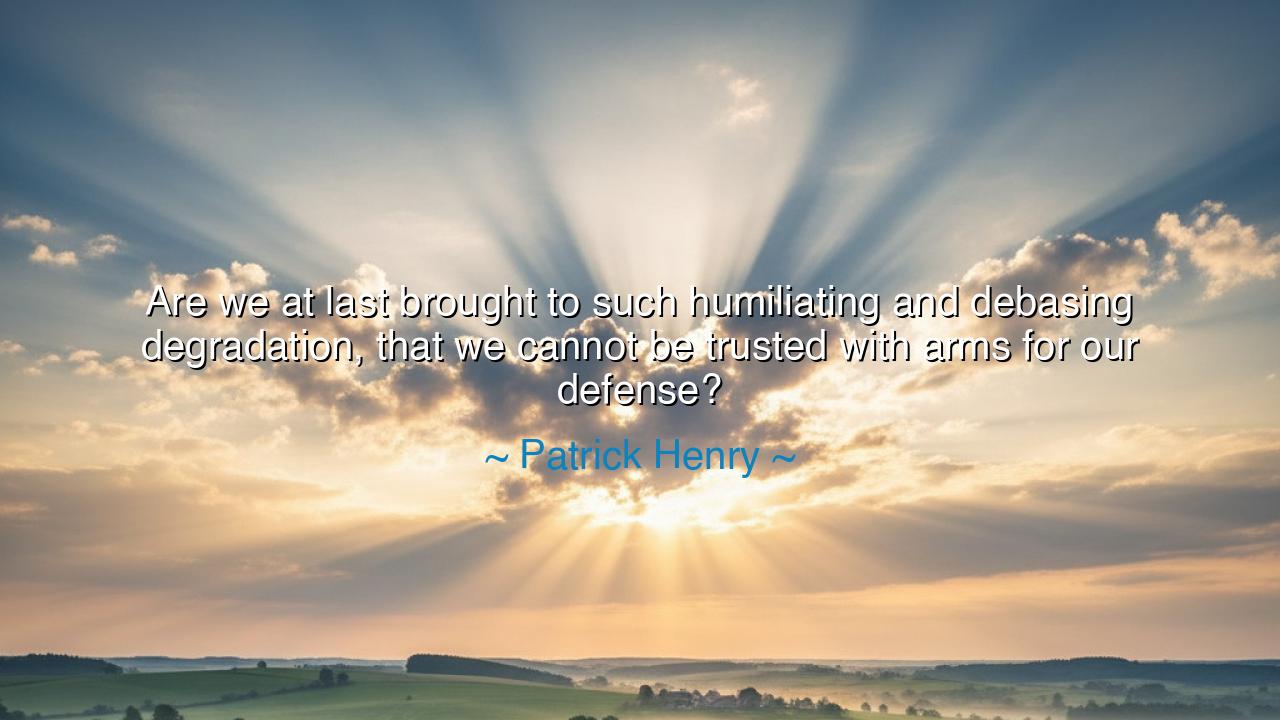
Are we at last brought to such humiliating and debasing
Are we at last brought to such humiliating and debasing degradation, that we cannot be trusted with arms for our defense?






The words of Patrick Henry—“Are we at last brought to such humiliating and debasing degradation, that we cannot be trusted with arms for our defense?”—thunder like the roar of a lion whose chains have been fastened too tightly. They are words born of a moment when free men faced the threat of tyranny, when the rights of self-preservation and liberty were weighed against the will of distant rulers. In this cry, Henry speaks to the eternal struggle: the battle between a people’s dignity and the power that would strip them of their strength.
To be denied the right of defense is, in Henry’s eyes, to be reduced not to citizens but to subjects, not to men but to children unworthy of responsibility. The ancients knew that arms were more than weapons; they were symbols of trust, of freedom, of manhood itself. In the Greek city-states, the shield was not merely iron but honor—the mark that a man bore responsibility for his home and his polis. To strip men of arms was to strip them of dignity, for it declared that they could not be trusted to guard their own lives.
Henry’s words arise from the very soil of the American Revolution. The colonists, taxed, controlled, and restricted, saw their weapons threatened by British decree. To take away their arms was not merely to weaken their strength but to declare them unworthy of freedom. For what is liberty without the means to defend it? What is the worth of a free man if he must beg protection from the very power that oppresses him? Thus, Henry’s fiery question is more than rhetoric—it is a challenge to the soul: shall we accept degradation, or shall we rise?
History offers its lessons. Consider the fate of nations that surrendered their means of defense to rulers who promised safety. Too often, safety became bondage, and protection became oppression. On the other hand, those who bore the burden of self-defense often won not only survival but respect. The American Revolution itself stands as a testament: men with little training, with muskets in their hands and conviction in their hearts, resisted one of the greatest empires on earth. They were trusted with arms, and with them, they carved the path to a new nation.
Yet Henry’s words are not merely about muskets and powder; they are about trust. To trust a people with arms is to declare them capable of self-rule, of responsibility, of maturity. To deny them is to treat them as slaves. Thus, Henry speaks not only of physical weapons but of the spirit of liberty itself. A people worthy of freedom must be trusted with the means to defend it, or else their so-called freedom is but a hollow illusion.
The lesson for us, children of later ages, is this: never surrender your dignity by accepting a role of helplessness. Whether in matters of nations or in the battles of the heart, you must be trusted with your own defense. Responsibility is the price of freedom, and freedom is the crown of the responsible. To lay down that burden is to accept chains, however gilded they may appear.
Practically, this means cultivating strength, vigilance, and responsibility. It means being prepared to defend what is just—your family, your community, your values—not through violence for its own sake, but with the sober recognition that peace endures only when there are those prepared to guard it. It means living as one who is worthy of trust, not waiting passively for others to secure your safety, but bearing the weight of liberty with courage.
So let Patrick Henry’s cry echo across the generations: “Are we at last brought to such humiliating and debasing degradation, that we cannot be trusted with arms for our defense?” Let it remind us that liberty is inseparable from responsibility, that dignity cannot be preserved without strength, and that no people should ever accept the lie that they are too weak to defend their own freedom. For to accept such a lie is to kneel, and to kneel is to forfeit the very soul of liberty.






AAdministratorAdministrator
Welcome, honored guests. Please leave a comment, we will respond soon